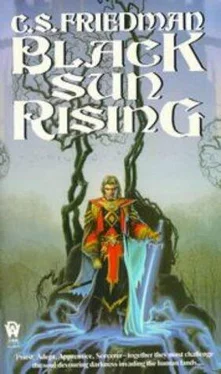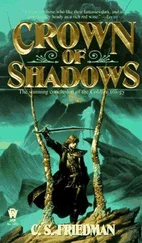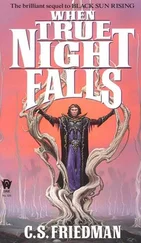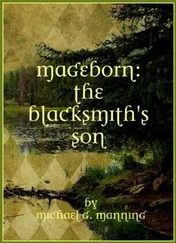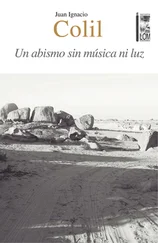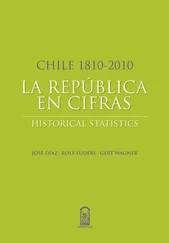Celia Friedman - Black Sun Rising
Здесь есть возможность читать онлайн «Celia Friedman - Black Sun Rising» весь текст электронной книги совершенно бесплатно (целиком полную версию без сокращений). В некоторых случаях можно слушать аудио, скачать через торрент в формате fb2 и присутствует краткое содержание. Жанр: Фэнтези, на английском языке. Описание произведения, (предисловие) а так же отзывы посетителей доступны на портале библиотеки ЛибКат.
- Название:Black Sun Rising
- Автор:
- Жанр:
- Год:неизвестен
- ISBN:нет данных
- Рейтинг книги:5 / 5. Голосов: 1
-
Избранное:Добавить в избранное
- Отзывы:
-
Ваша оценка:
- 100
- 1
- 2
- 3
- 4
- 5
Black Sun Rising: краткое содержание, описание и аннотация
Предлагаем к чтению аннотацию, описание, краткое содержание или предисловие (зависит от того, что написал сам автор книги «Black Sun Rising»). Если вы не нашли необходимую информацию о книге — напишите в комментариях, мы постараемся отыскать её.
Black Sun Rising — читать онлайн бесплатно полную книгу (весь текст) целиком
Ниже представлен текст книги, разбитый по страницам. Система сохранения места последней прочитанной страницы, позволяет с удобством читать онлайн бесплатно книгу «Black Sun Rising», без необходимости каждый раз заново искать на чём Вы остановились. Поставьте закладку, и сможете в любой момент перейти на страницу, на которой закончили чтение.
Интервал:
Закладка:
“I’ll tell her.”
“That’s it, I think.” She lifted a jacket from the coatstand near the door, and smiled at Damien as she donned it. “Your treat?”
“My honor,” he responded.
“The New Sun, then. You’ll like it.” She glanced back, toward her assistant. “I’ll be there if you need me, Zen; just Send.”
He nodded.
Damien offered her his arm. She stared at it for a moment, clearly amused by the custom, then twined her own smaller limb about it. “You can stable your horse there,” she informed him. “And I think you’ll find the neighborhood . . . interesting.”
Interesting was an understatement.
The Inn of the New Sun was one of several buildings that bordered Jaggonath’s central plaza, as prime a piece of real estate as one could ask for. The restaurant’s front room looked out upon several neat acres of grass and trees, divided up into geometrical segments by well-maintained walkways. By its numerous pagodas and performance stands, Damien judged that the plaza hosted a score of diverse activities, probably lasting through all the warm-weather months. It was truly the center of the city, in more than just geography. And at the far side, gleaming silver in the moonlight . . .
A cathedral. The cathedral. Not surrounded by satellite buildings of its faith, as was the Great Cathedral in Ganji, but part and parcel of the bustling city life. He moved to where he could get a view clear of the trees, and exhaled noisily in admiration. If rumor was truth, it was the oldest extant church on the eastern continent. Built at the height of the Revival, it was a monument to the tremendous dramatic potential of the Neo-Gothic style. Archways and buttresses soared toward the heavens, creamy white numarble reflecting moonlight and lamplight both with pristine perfection. Set against the dark evening sky, the building glowed as though fae-lit, and drew worshipers to it like moths to a flame. On its broad steps milled dozens—no, hundreds of worshipers, and their faith tamed the wild fae that flowed about their feet, sending it out again laden with calmness, serenity, and hope. Damien stared at it, awed and amazed, and thought, Here, in this wild place, the Dream is alive. A core of order, making civilization possible. If only it could have been managed on a broader scale . . .
Her light touch on his sleeve reminded him of where he was and who he was with, and he nodded.
Later.
She ordered food for both of them. Local delicacies, she said. He decided not to ask what they’d looked like when they were alive. But despite his misgivings he found them delicious, and the thick, sweet ale that was Jaggonath’s specialty was a welcome change after months of dried rations and water.
They talked. He told her stories, in payment for the map, embroidering upon his true adventures until her gentle smile warned him that he bordered on genuine dishonesty. And gave her real news, in a more sober vein. Five ships wrecked on the Ganji cliffs, a diplomat from the Wetlands lost in the tragedy. Summer storms from out of the desert, as if the sandlands themselves would claim new territory. Tsunami. Earthquakes. Politics. She was interested in everything, no matter how trivial it seemed to him, and would give him no information in return until he had finished to her satisfaction.
By the time their dessert came the night was as dark as most nights ever got, the sun and Core wholly gone, one moon soon to follow, a few lingering stars barely visible above the horizon.
“So,” she said pleasantly, as she spooned black sugar—another Jaggonath specialty—into a thick, foamy drink. “Your turn. What is it you hunger most to know?”
He considered the several half-jesting answers he might have offered another woman, then reconsidered and discarded them. An open offer of information was just too valuable an opportunity to waste on social repartee.
“Forest or Rakh,” he answered, after very little thought. “Take your pick.”
For a moment—just the briefest moment—he saw something dark cross her countenance. Anger? Fear? Foreboding? But her voice was its usual light self as she leaned back and asked him, “Ambitious, aren’t you?”
“Those things are only legends where I come from. And shadowy legends, at that.”
“But you’re curious.”
“Who wouldn’t be?”
“About the Forest? When merely thinking about it opens up a channel for the dark fae to travel? Most men prefer to avoid that risk.”
The Forest. The fact that she had chosen that topic meant that it was the other one which had caused her such acute discomfort; he filed that fact away for future reference, and addressed himself to the issue she preferred. The Forest, called Forbidden in all the ancient texts. What did they know of it, even here? It was a focal point of the wildest fae, which in an earlier, less sophisticated age had been called evil. Now they knew better. Now they understood that the forces which swept across this planet’s surface were neither good nor evil in and of themselves, but simply responsive. To hopes and fears, wards and spells and all the patterns of a Working, dreams and nightmares and repressed desires. When tamed, it was useful. When responding to man’s darker urges, to the hungers and compulsions which he repressed in the light of day, it could be deadly. Witness the Landing, and the gruesome deaths of the first few colonists. Witness the monsters that Damian had fought in the Dividers, shards of man’s darkest imaginings given fresh life and solid bodies, laying traps for the unwary in the icy wilderness.
Witness the Forest.
“Sheer concentration makes the fae there too strong to tame,” she told him. “Manifestial response is almost instantaneous. In plainer English, merely worrying about something is enough to cause it to happen. Every man that’s dared to walk in those shadows, regardless of his intentions, has left some dark imprint behind him. Every death that’s taken place beneath those trees has bound the fae to more and greater violence. The Church once tried to master it by massive applications of faith—that was the last of the Great Wars, as I’m sure you know—but all it did was give them back their nightmares, with a dark religious gloss. Such power prefers the guarded secrets of the unconscious to the preferences of our conscious will.”
“Then how can man thrive so close to it? How can Jaggonath—and Kale, and Seth, and Gehann—how can those cities even exist, much less function?”
“Look at your map again. The Forest sits at the heart of a whirlpool, a focal point of dark fae that draws like to like, sucking all malevolent manifestations toward its, center. Most things that go in never come out again. If it were otherwise we could never live here, this close to its influence.”
“You said that most things never leave.”
She nodded, and her expression darkened. “There’s a creature that lives within the Forest—maybe a demon, maybe a man—which has forced a dark sort of order upon the wild fae there. Legend has it that he sits at the heart of the whirlpool like a spider in its web, waiting for victims to become trapped in its power. His minions can leave the Forest and do, in a constant search for victims to feed to him.”
“You’re talking about the Hunter.”
“You know the name?”
“I’ve heard it often enough, since coming east. Never with an explanation.”
“For good reason,” she assured him. “Merely mentioning the name opens a channel through the fae . . . people are terrified of such contact. It’s more than just the Hunter himself. He’s become our local bogeyman, the creature that lurks in dark corners and closets, whose name is used to scare children into obedience. Easterners are raised to fear the Hunter more than any other earthly power, save the Evil One himself. And don’t take me wrong—he is, genuinely, both powerful and evil. His minions hunt the shadows of the eastern cities for suitable prey, to take back to the Forest to feed to him. Women, always; mostly young, inevitably attractive. It’s said that he hunts them like wild animals there, in the heart of that land which responds to his every whim. A very few survive—or are permitted to survive, for whatever dark purpose suits him. All are insane. Most would be better off dead. They usually kill themselves, soon after.”
Читать дальшеИнтервал:
Закладка:
Похожие книги на «Black Sun Rising»
Представляем Вашему вниманию похожие книги на «Black Sun Rising» списком для выбора. Мы отобрали схожую по названию и смыслу литературу в надежде предоставить читателям больше вариантов отыскать новые, интересные, ещё непрочитанные произведения.
Обсуждение, отзывы о книге «Black Sun Rising» и просто собственные мнения читателей. Оставьте ваши комментарии, напишите, что Вы думаете о произведении, его смысле или главных героях. Укажите что конкретно понравилось, а что нет, и почему Вы так считаете.
